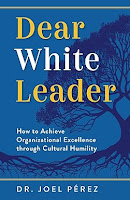Dear White Leader... is very straight-forward, including examples, stories, and "taking action" recommendations at the end of each chapter. The primary assertions of the book are that two attitudes are essential for exceptional leadership to unfold - humility and curiosity.
Perez clearly defines his terms and elements related to them throughout the book. He starts by identifying three components of humility: 1) a commitment to self-awareness and self-critique; 2) redressing power imbalances; and 3) changing the systems of organizations and communities to be more inclusive. These three are then incorporated into the internal, external, and systemic work required for exceptional leadership (Figure 1, p. 15). One of the keys to cultural humility is suspending judgement or checking oneself from jumping to conclusions about others. Cultural humility includes affirming one's one values and beliefs while at the same time remaining open to those of others, thus not suggesting that either change the core of who they are. This attitude is essentially curiosity - openness to explore without judgement.
Cultural competence is defined as "the acquisition and maintenance of culture-specific skills" (p. 38) which is acquired through the four attributes of self-awareness, attitude, knowledge, and cross-cultural skills. Humility in these four attributes is reflected in adopting a growth mindset, curiosity, and listening deeply. And this kind of cultural competence, especially for cultures that are new or very different from one's own, is significantly improved by finding a cultural coach or mentor to help navigate the differences we encounter.
Beginning with the attributes of self-awareness and self-critique, Perez explained different types of bias that can get in the way of cultural understanding. They included unconscious or implicit bias, confirmation bias, and affinity bias, which progressively diminish in the developmental sequence of denial, polarization, minimization, acceptance, and adaptation. Privilege, or lack thereof, can impact an individuals' journey toward cultural understanding because those with privilege are often unaware of, or do not recognize, the power they hold versus those who have little power and are all too painfully aware of how they are discredited and disregarded. Perez recommends that becoming comfortable with uncertainty of cultural difference involves cultivating the eight practices of noticing, breathing, moving, sleeping, laughing, wondering, experimenting, and loving.
Ultimately, diverse cultural environments require the awareness of, and willingness to address, power imbalances among the individuals and within the groups where exceptional leadership is desired. Power differences are reflected in who is heard, valued, and matters and the question is if equality or equity is the objective."Equality is when a person or group of people are provided with the same resources or opportunities that everyone has. Equity is recognition that each person has different circumstances and is given specific resources and opportunities to get to an equal outcome" (p. 92).
Perez identified four dimensions of diversity that foster organizational inclusion and belonging. They are "organizational vitality and viability, recruitment and engagement, training and development, and organization climate and intergroup relations" (p. 105). To improve these conditions, exceptional leaders will be most effective when they concentrate on the middle 2/3rds of their members who comprise the middle to late adopters. The early adopters are already on board and the laggards will seldom, if ever, join in. Those in the middle can be encouraged to come along by applying what all musicians in an ensemble inherently understand - outstanding performance comes from working with and nurturing each other and striving to be better TOGETHER.

No comments:
Post a Comment